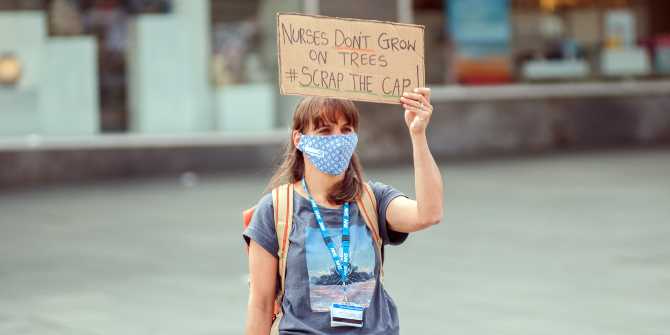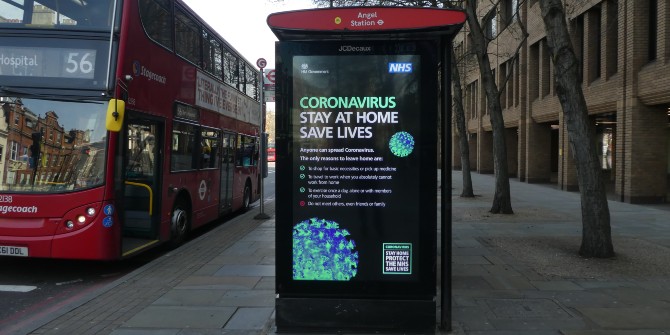In this time of immense socio-economic upheaval, nationally and globally, much is made of how international law operates in dramatic circumstances. Margot E. Salomon (LSE) invites us to consider how practices that appear to suspend business as usual are better understood as a continuation of international law in sustaining our unequal world. Pointing to the regimes of international investment, sovereign debt, human rights and international cooperation, as well as international law’s partiality for fast violence, she argues that reconstituting the unequal global system after the pandemic requires that we first address disciplinary barriers to that essential project.
Suspending business as usual is still business as usual
The investor-state dispute settlement system that has dominated international investment law for decades has come under increased scrutiny in the past years. The concern governments have of being sued by foreign multinational companies for financial losses from bonafide measures, including expected future profits, has seen the system of investment treaty arbitration challenged for chilling a government’s willingness to regulate in the public interest, for human development and in protecting the environment. The controversial, multimillion or billion-dollar awards against (poor) countries that the transnational private sector has secured are known to have left gaping holes in the budgets of governments, with the average legal costs of a dispute running into the millions per party, money that comes from the public purse. Now, amidst the ravages of the pandemic and the socio-economic costs, civil society is calling for a moratorium on investor-state dispute settlement claims during the pandemic. The demand is premised on the arguments that governments should not be deterred from acting in the public interest at this time, they should not be distracted at this critical juncture, nor should they be spending large sums on arbitration.
There is a real risk that states will be sued for COVID-19 related measures such as suspending payment by the poor to private utility companies to ensure handwashing is accessible to all and securing temporary public control over private hospitals during the crisis to relieve overrun public hospitals. With an eye to widespread changes necessary to keep the impact of the virus manageable, there is also a call for the moratorium to continue ‘until governments have agreed on principles to ensure that future arbitration cases will not hinder countries’ good faith recovery effort’ and for a permanent restriction on any claim related to government measures ‘targeting health, economic, and social dimensions of the pandemic and its effects’. Likewise, the calls for a moratorium on sovereign debt repayment have seen the G20 agree to suspend debt service payments for the poorest countries, until the end of 2020 (NB: for those LDCs that are up to date in their debt service payments to the World Bank and the IMF).
The demand for permanent restrictions on claims arising out of government pandemic measures in the public interest recognise the short-termism of suspending business as usual. There are other important interventions that recognise the need for a longer time frame and for subsequent debt restructuring and relief, as well as highlight the risk of austerity conditionality entering on the back of the new debt acquired to plug fiscal deficits created to respond to COVID-19. Set against structural features of international law, what risks accompany suspending business as usual?
International law is a product of capitalism and an enabler of it. It has been shaped by the past quests for capitalist expansion of dominant powers and essentially continues on that trajectory today. These moratoria in the area of international arbitration or debt operate together with the usual practices of international investment law and global finance, as exceptions to them. International arbitration was set up to see prioritised the interests of foreign investors over those of host states and local communities. Recent diplomatic efforts at reform reflect a belated effort to claw back asymmetrical power handed to the private transnational sector, revisiting now 50 years later the unheeded demands by developing countries in the 1970s to advance a New International Economic Order. As for debt, Africa alone spends trillions on debt servicing, funds forcibly redirected by the World Bank and IMF from healthcare and other basic needs and rights for decades. Capital-exporting states have long been unwilling to overhaul these regimes and to see social and other rights taken seriously.
Essential as these moratoria are to protect the ability of countries – especially poorer countries – to dedicate their resources to confronting the pandemic, supporting lives and well-being, and emerging from the pandemic’s many devastations, they are at once a manifestation of a deeper disciplinary malaise. Any official turn merely to suspend temporarily capitalism’s necessary practices of exploiting the poor and vulnerable does not represent a legal conversion to the case for revolution, it is an extension of what international law has always been and, fundamentally, a reaffirmation of it.

The evanescent dream of obligations of international assistance and cooperation
As a matter of law, states have obligations of international assistance and cooperation in the area of socio-economic rights. The status of this normative expectation is matched only by the depth of non-compliance. Northern states consider it to be an act of charity and purely discretionary. Whatever it entails, there is no real sanction for non-compliance – the international human rights system was not set up for that. If any aspects of fulfilling the obligation is met during the COVID-19 pandemic, such as sharing research and medical equipment, coordinating action to reduce the economic and social impacts of the crisis, and having influential states use their voting powers in international financial institutions to alleviate the financial burden of developing countries in combating the pandemic, as the Committee on Economic, Social and Cultural Rights suggests in its COVID-19 Statement, it won’t have had much to do with the fact that they have a human rights obligation. This 21st-century pandemic is a borderless phenomenon but only in the most superficial sense.
International law’s partiality for fast violence
In his evocative book on ‘Slow Violence and the Environmentalism of the Poor’ the postcolonial eco-critic Rob Nixon alerted us to the problem of ‘slow violence’ by which he means attritional violence, often out of sight, the long-term emergency when we’re taught to deal with immediate emergencies first, processes that originate in catastrophic actions yet do not register as violence at all, crises that more and more emphatically encroach upon the present. International law is prone to a similar bias with its thin conception of crises and violence. It was in a 2002 study of international law’s engagement with a spectacular crisis of military intervention that Hilary Charlesworth alerted readers to methodologies that obscure systemic issues such as widespread poverty. There are lessons we can draw from Nixon and Charlesworth about our discipline and the pandemic even while we are in the midst of it.
COVID-19 undoubtedly poses an immediate threat with grave risks to life, health, livelihood, and a functioning society and economy, with a daunting list of other threats to mental and physical well-being. Its scale and gravity have rightly demanded urgent action across the medical and social sciences. Against one set of metrics the pandemic is a paradigmatic case of fast violence – dramatic, deadly, dystopian. In the circumstances, international law either provides certain tools (e.g: temporary derogation from human rights treaties in states of emergency; minimum core obligations regarding socio-economic), turns to exceptions (e.g: while there is pushback from the US and others, CESCR reminds states parties that they should ‘promote flexibilities or other adjustments in applicable intellectual property regimes to allow universal access to the benefits of scientific advances relating to COVID-19 such as diagnostics, medicines and vaccines’) or fragments (e.g. reflecting the primacy given to the free movement of goods not people seafarers have been required to deliver cargo but not allowed to disembark during the pandemic). But both the root of the problem and its disproportionate impacts on certain sectors of (global) society point to deeper, chronic crises of slow violence.
The slow violence of environmental degradation; of poverty, inequality and their intersections with race, gender and income, nationally and globally, reflect the original catastrophe that the pandemic has laid bare, and one in which international law is implicated – through the activities it facilitates and the interests it protects. We’ve disturbed the natural world and now it is disturbing us. Deforestation has concentrated animals in smaller areas where they swap infectious microbes, raising the chances of novel virus strains like SARS-CoV-2. Deforestation today is driven by conversion to cropland for subsistence and large-scale commercial activities in the global south to satisfy foreign markets for food and biofuels, and while domestic policies aimed at economic development play a role, global economic factors such as foreign debt, expanding markets for rainforest timber and pulpwood, and the low domestic costs of land, labour, and fuel can encourage deforestation. For current purposes, a consequence of deforestation and our encroachment on the environment is that it has brought humans closer to the animals that carry viruses that can be dangerous when transmitted to humans. And while the virus threatens all humans, all human are not equally threatened; ‘every fissure of inequality has become a vector of contagion’, as one commentator put it. The virus that caused COVID-19 may have spread to humans via bats, but it is our doing: international law’s partiality for fast violence; its incomplete characterisation of what constitutes a crisis; its commitment to growth and commodification; and the slow violence of environmental degradation, poverty, and inequality.
Conclusion: the start of something new, perhaps
Usual legal practices have been suspended but are they a turn away from our world dependent on the market and devoted to commodification? The suspension of normal does not reflect the shunning of our international legal order nor the initial instantiation of a different one.
The global pandemic is surely an opportunity to challenge radically the world as it was before the pandemic (as many had long been doing). In his recent postcapitalist treatise the artist Ian Alan Paul prompts us in this direction by asking: ‘What is the value of work? How might we allocate resources differently if we didn’t have to consider price? Is privatized healthcare defensible? Are prisons truly necessary? As we witness the cancellation of utility, mortgage, and rent payments, the public takeover of private healthcare systems, the cessation of arrests for low-level offenses, and the calls for the cancellation of all debt, what else might we call into question … ? ‘.
International law is a route through which failures of our global system are constituted and, now, illuminated. A chink has opened up where common endeavour and collective action are valued and where some areas are removed from market rationality. There is opportunity in rupture, but not for long.
This post represents the views of the author and not those of the COVID-19 blog or LSE. It was written for the launch of the LSE Law Department Executive LLM Alumni Webinar Series, June 2020.






Thank you for your remarks. It is indeed very unrealistic to expect governments of poor countries to comply with their liabilities towards foreign investors; and as you highlight, these countries will probably not be properly presented/defended in disputes due to high costs… So, perhaps foreign investors will become a great fear let alone encouraging them with greater rights, no?